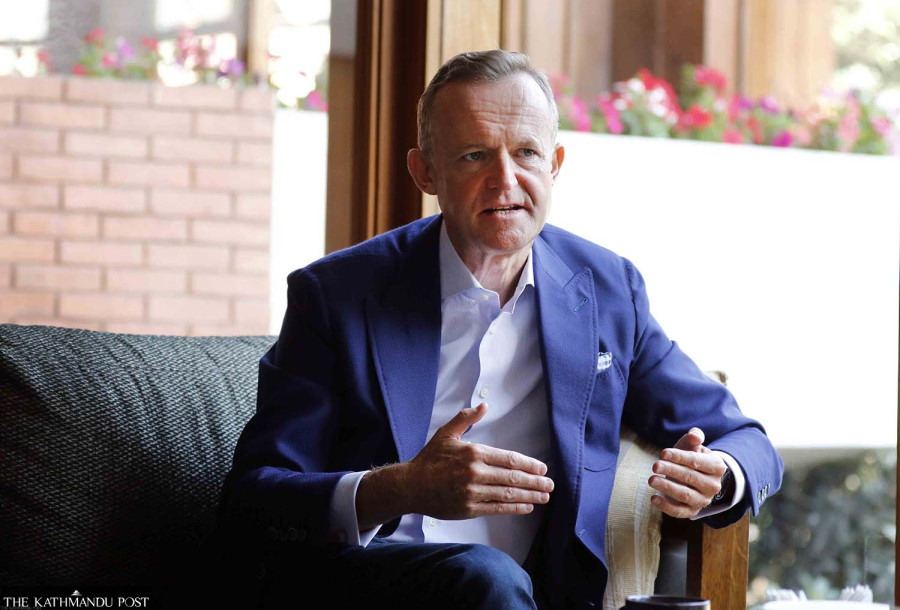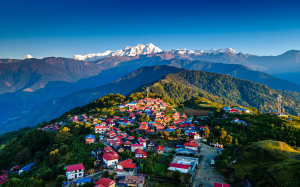Money
Remittance and tourism will cushion Nepal against inflation, banker says
As per Mashreq Bank executive James Pearson, 2023 will be a challenging year for many economies and consumers.
Himendra Mohan Kumar
Rising remittance flow and growing tourist numbers in 2023 will likely cushion Nepal against high fuel prices and global inflation resulting from interest rate hikes by the United States Federal Reserve, an industry expert said.
James Pearson, executive vice-president and global head of financial institutions and non-bank financial institutions at Dubai-based Mashreq Bank, told the Post during an official visit to Kathmandu, "I met Nepal's central bank governor here. It was clear that they feel positive that they have their foreign exchange reserves under control. Remember, remittances of US dollars from overseas are significant."
Pearson said remittances to Nepal had started to go up again after dipping during the pandemic. The central bank expects tourist arrivals to rebound to 2019 levels in 2023, which will boost foreign exchange reserves, he added.
"People have a pent-up desire to travel again, and Nepal has some unique attractions. Tourism contributes up to 15 percent to Nepal's GDP," said Pearson.
"Nepal is a well-run economy, and there is consistency in economic policy. Foreign participants like us, we like some kind of economic stability. As long as the government can maintain good macro, fiscal and monetary policies, that is the kind of place we want to do business in."
Nepal's biggest trading partners are India and China, and it's good for Nepal that India is doing well, he said.
"Nepal is also fortunate because you have a very significant number of expat workers who are providing remittances. You have around 600,000 workers in Qatar and nearly 400,000 in the United Arab Emirates, and those economies are oil-linked economies and they are strong. So, that should support Nepal."
Commenting on Mashreq Bank's activities in Nepal, which maintains a representative office in Kathmandu, Pearson said, "We provide commercial banking services through all 26 commercial banks in Nepal. We open US dollar accounts for them so that they can trade, import and export. We provide trade finance services so that importers can import, for example, fuel oil."
Pearson added, "We also do some selective lending, we provide deposit products and we also facilitate foreign exchange. We provide investment products too, and one of the products we are going to be developing very soon is helping the big banks here with remittance flows into this market from the many expat workers. We have had very productive discussions with the leading banks here."
He said that 2023 would be a challenging year for many economies and consumers as the inflationary impact of high oil prices would be felt in all oil importing countries, including Nepal.
"Oil is priced in US dollars, and the US dollar is appreciating. The price of oil is also appreciating. Governments in most countries are the principal importers of oil, so their foreign exchange reserves are depleting. Second, oil is always a significant part of the cost of living whether you are in Nepal or London or anywhere else in the world. The reason why inflation has gone up to 8 percent here is largely because of the price of oil," Pearson added.
He said inflation goes up because of the price escalation in all things that are produced using oil.
"Consumers suffer and they reduce consumption. They have to stop spending on non-essential things, and that is what slows the economy. There will be reduced consumption patterns in Nepal as well. I think consumers have to make choices," said Pearson.
He added that the Nepal government's current policy of curbing imports of luxury items, which it considers non-essential, was correct. "Now it's important for the government to retain enough foreign exchange reserves to provide for essential imports. The imports are becoming more expensive and Nepal imports a lot."
Commenting on the US Federal Reserve's four consecutive jumbo interest rate hikes of 75 basis points and more increases set to follow in December and next year to bring the US inflation rate to its targeted 2 percent, Pearson said, "Anytime you try to reduce inflation using monetary policy, you will put consumers under pressure because the cost of money in the system increases, and the cost of living increases too."
He said a short recession in Europe was likely. "I don't think there will be a recession in the US. But even if there is no recession, these economies will not be able to import as much, and their economic activities will decline, and that will affect the rest of the world."
Pearson said most of the countries in the Gulf Cooperation Council remain strong economically, and they are big providers of foreign currency to Nepal through expat remittances. "So, that, I think, should cushion any stress that Nepal faces from a declining global economic activity."
Nepal's gross foreign exchange reserve was in the value of $9.35 billion in mid-September, down 2 percent from $9.54 billion in mid-July, according to the latest data of Nepal Rastra Bank.
Mashreq Bank maintains representative offices in Kathmandu, Karachi, Dhaka and Shanghai. It has branches across the UAE, the Gulf countries and Egypt, besides India, Hong Kong, London and New York.




 22°C Kathmandu
22°C Kathmandu














